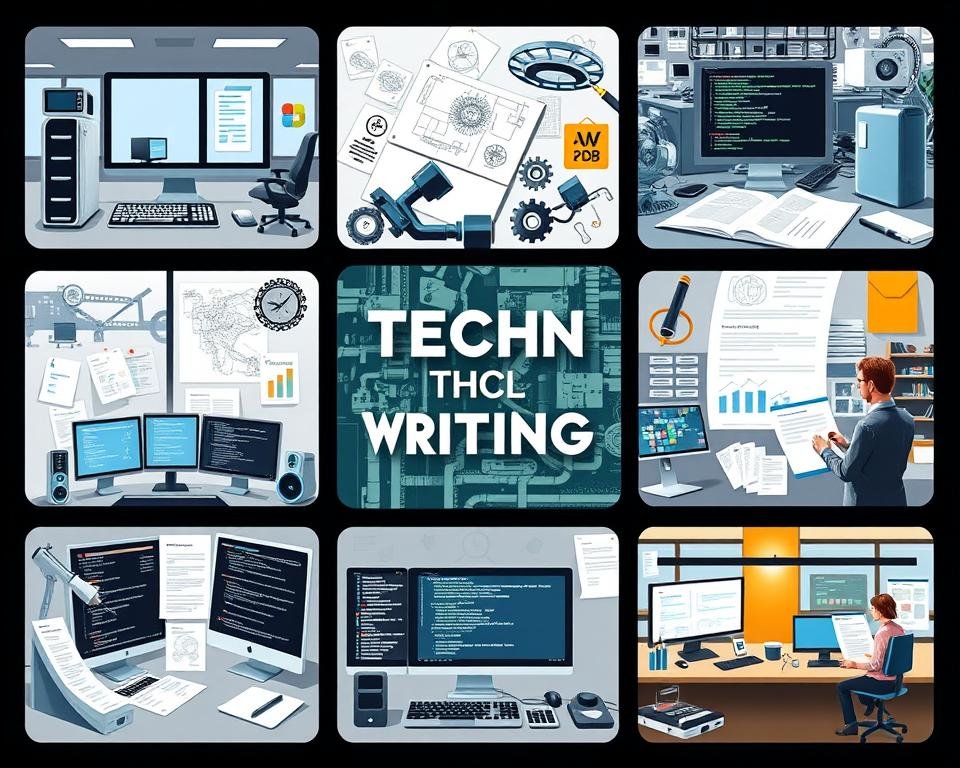Technical writing is a key skill in many fields. It helps share complex information clearly to the right people. This skill is vital in areas like manufacturing, engineering, and healthcare.
Technical writers make manuals and documents. They also ensure everything follows the rules. The U.S. Bureau of Labor Statistics says this job will grow 7% by 2032.
When applying for jobs, employers want to know if you’re interested in technical writing. Show them your passion and skills in this area. It’s important to research the company and the job you’re applying for.
Don’t give vague answers. They can hurt your chances of getting the job. A good answer shows you’ve done your homework and are serious about the role.
Understanding Technical Writing in Modern Professional Landscape
Technical writing is key to clear communication in companies. It helps share ideas and information well. It includes many types of documents, like system specs and user manuals.
Core Components of Technical Writing
Technical writing has grown a lot, thanks to tech companies. It’s now a big part of the IT world. Writers at places like Apple and Microsoft make instructions easy to follow. They also explain complex tech like AI and biometric security.
Industry Applications and Significance
Technical writing isn’t just for IT anymore. It’s also used in healthcare, finance, and marketing. Writers help make hard ideas easy to understand. They make sure complex designs are explained well.
Evolution of Technical Documentation
The importance of clear writing hasn’t changed. It’s as vital as ever in many fields. New tools and ways of writing are making things better. They help users and make working on projects easier.

“Technical writing simplifies complex information through clear, straightforward content, making it accessible to all.”
Why Is Technical Writing Important When Applying for a Job
Technical writing skills are key when you’re looking for a job. They show you’re good at communication abilities, attention to detail, and explaining complex stuff simply. These are all important job application skills. Employers love technical writing because it helps teams and clients understand things better.
Technical writing means you can dig into complex topics and explain them well. This skill is useful in many fields, making you a more appealing candidate. It shows you can make documents easy for others to use, which is important in many jobs.
In engineering, for instance, a skilled technical writer can share project news and findings clearly. This can help you move up in your career. In the pharmaceutical world, it’s key for writing about drug making to keep things safe and follow rules.

Technical writing also helps share knowledge well. This is super useful in places like manufacturing, where new tech is always coming in. Good manuals can cut down on questions, make customers happier, and save time and money.
When you talk about your technical writing skills in your application, you show you’re good at communication abilities, attention to detail, and more. These are things employers really want in their teams, no matter the industry.
Essential Skills and Qualifications for Technical Writers
To be a great technical writer, you need a mix of subject matter expertise, clarity in writing, and attention to detail. These skills help technical writers do well in their jobs.
Writing and Communication Abilities
Technical writing is all about making complex info easy to understand. Writers must have strong writing skills. They need to organize content well, use the right words, and make sure their writing is clear. Clear writing is key.
They also need to communicate well. This means listening well and explaining technical stuff to people who don’t know it. Being able to do this is very important.
Technical Proficiency Requirements
Technical writers must know how to use many software tools and technologies. They need to know markup languages like XML, HTML, and CSS. They also need to be good with document management systems, layout design tools, and multimedia editing software.
Being able to learn new tech quickly is also important. The field is always changing, and writers need to keep up.
Industry-Specific Knowledge
- They need to understand the products or services they write about. This includes knowing how they work, what they do, and how to fix problems.
- They must also know a lot about the industry. This includes its terms, processes, and rules.
- They should know who their audience is and write for them. This means writing for both experts and regular users.
- They need to know how to use different ways to communicate. This includes writing user manuals, online help, and interactive tutorials.
With a strong mix of subject matter expertise, clarity in writing, and attention to detail, technical writers can make complex info easy to understand. This helps products and services work well for everyone.

Technical Writing Across Different Industries
Technical writing is a valuable skill needed in many fields. It helps explain complex ideas in simple terms. This is true in IT, healthcare, engineering, and biotechnology.
In tech, writers create guides for systems and software. They make sure users can use products easily. In healthcare, they write manuals and documents for patients and doctors. This helps improve care and follow rules.
Engineering and manufacturing need writers for safety and process guides. They help keep operations smooth and safe. In biotech and pharma, writers document research and product info. This helps science move forward.

The aerospace and defense fields also need technical writers. They document complex systems and maintenance. This ensures these technologies are safe and work well.
Technical writing is key in many industries. It helps with clear communication, following rules, and understanding. It’s a vital skill for many careers.
Career Growth and Financial Prospects in Technical Writing
The technical writing field is full of opportunities for career growth and financial success. With the right job application skills and technical documentation knowledge, you can thrive. Most technical writers earn between $60,000 to $70,000 a year. Freelancers can make $30 to $50 per hour, while contractors can earn $400 to $2,500 per project.
Salary Expectations and Job Market Trends
The demand for technical writers is set to skyrocket by 2029, with a 200% increase in employment. As of May 2021, the median salary in the U.S. is $78,060. The field is expected to grow by 6% from 2021 to 2031, with 5,400 job openings each year.
Professional Development Opportunities
Technical writers can improve their skills through various opportunities. These include certifications, attending conferences, and learning new technologies. Creating a strong portfolio of your work is also key to advancing in your career.
Industry Demand Projections
The need for technical writers is expected to stay high, with strong demand in IT and Medicine. In 2021, there were 55,400 technical writers working. By 2031, this number is projected to rise to 58,400, according to the U.S. Bureau of Labor Statistics.
“The technical writing field offers a wealth of opportunities for those who are passionate about clear and concise communication, a love for technology, and a drive to continuously learn and grow.”
Building a Strong Technical Writing Portfolio for Job Applications
When you apply for technical writing jobs, a strong portfolio is key. It should show your skills in making clear, easy-to-use technical documents. This includes user manuals, instructional guides, and more. Focus on projects that show you can make complex info simple, pay attention to details, and use the right tools.
If you don’t have professional experience yet, don’t worry. Start by working on open-source projects or making sample documents. This shows your technical writing skills and your hard work. Also, highlight any certifications or training you’ve had in technical writing.
“A technical writing portfolio is like a cover letter – it’s the first impression that hiring managers get of your writing abilities and skills.” – Jane Doe, Technical Writing Consultant
When you share your portfolio, use a professional platform or your own website. This makes your work look polished and organized. Tell stories behind each sample to give context and show your problem-solving skills.
Keep improving your portfolio with new projects and achievements. This shows you’re up-to-date and can adapt to new demands. It’s important in the world of technical documentation and user manuals.
Creating a strong technical writing portfolio is a smart move for your career. It’s a powerful way to show your job application skills and stand out. By showing your expertise and flexibility, you’ll have a better chance of getting noticed in the competitive job market.
Common Challenges and Solutions in Technical Writing Careers
Technical writing is a field that changes fast. It needs writers who can adapt and solve problems. They face challenges like keeping up with new tech, handling complex info, and meeting deadlines without losing quality.
Adapting to New Technologies
Keeping up with tech changes is hard for technical writers. They must always learn new things. This helps them share complex info well with different people.
By networking and taking training, writers can grow their skills. This keeps them current and effective in their work.
Managing Complex Information
Technical writing mixes lots of info from experts and specs. Writers need to research well and work with experts. This ensures they get the right info.
Using tools like content management systems helps manage this info. It makes the job easier and keeps everything organized.
Meeting Deadlines and Quality Standards
Writers often face tight deadlines and changes. They must manage their time well and work with teams. This helps them meet deadlines and keep quality high.
Getting feedback from others improves the work. It makes sure the writing is clear and meets the audience’s needs.